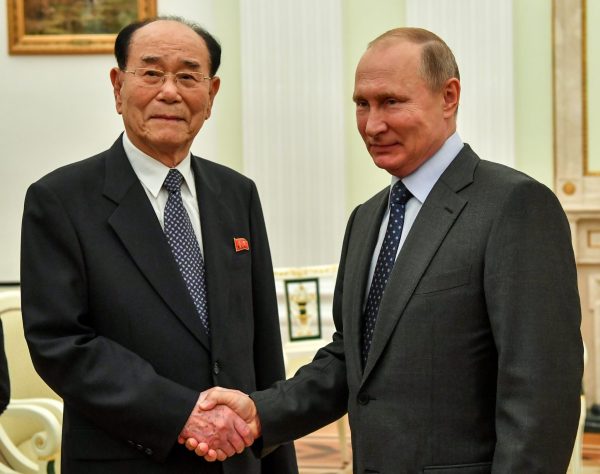Judging by the comments of Russian President Vladimir Putin’s press spokesman Dmitry Peskov, Moscow sees its stance as having been justified by the Trump–Kim Singapore summit. He told journalists on 13 June that ‘just the fact that such a meeting took place and direct firsthand dialogue was started can only be welcomed’. On the same day, Russian Foreign Minister Sergei Lavrov described direct contact between the United States and North Korea as ‘worth supporting’ and noted President Trump’s statement ‘that there is no need for new American–South Korean drills at the specified stage’.
In these statements, Lavrov hinted that Russia had a role to play in the whole denuclearisation process. He stressed that ‘it will hardly be possible to solve these problems in the bilateral format’ and that ‘all the participants of the six-party talks have always proceeded from the fact that this process has to result in the creation of a system of peace, security and stability across Northeast Asia’.
By emphasising the multilateral nature of the North Korean denuclearisation process and stressing the need for the region’s involvement in it, Lavrov set down a marker for Russia’s participation in the process. Indeed, Lavrov visited North Korea on 31 May 2018 and met Kim Jong-un and North Korean Minister of Foreign Affairs Ri Yong-ho.
Other cautious voices on the summit are worth noting. Russian Senator Konstantin Kosachev, head of the Foreign Affairs Committee in the Russian upper house, remarked that ‘there’s no certainty that both sides will immediately rush to build on the Singapore success. Trump’s words that the process of denuclearisation on the Korean Peninsula will begin “very very soon” is more of a wish than fact’. His deputy, Senator Vladimir Dzhabarov, pointed out that ‘the denuclearisation issue is unlikely to be on the agenda yet, because Kim Jong-un remembers too well what happened with [Libya’s Muammar] Gaddafi, [Iraq’s Saddam] Hussein, [and] other heads of state. That’s why nuclear weapons [are] his security guarantee’.
In the months preceding the Singapore summit, Russia and China had been leading the effort to bring a resolution to the nuclear crisis between North Korea and the United States. Russian Deputy Foreign Minister Igor Morgulov had proposed a three-stage plan in November 2017. The first step, he said, should be the reduction of military tension. Its starting point is the ‘double freezing’ — the suspension of both missile launches and nuclear tests by North Korea. The second stage should be direct negotiations between North Korea, South Korea and the United States. The third and final stage would see the launching of a process with all the countries involved to discuss the entire complex of issues relating to collective security in Asia.
Russia does not now want to be placed on the sidelines of the denuclearisation process after its earlier extensive efforts. As a neighbour of North Korea, Russia cannot help being involved in and concerned about the future of that country. Geographical proximity means that political instability could lead to mass refugee outflows into Russia. Russia also would not want to see the replacement of the Kim regime by another government that might seek close links with the South and the United States.
The worst-case scenario for Russia would be Korean reunification based on the South’s leadership or domination — especially if that were to lead to a strengthened alliance with the United States military forces’ being stationed near or on the Korean–Russia border. Russian prestige and international status also come into play — Moscow stands to gain if its participation were to lead to the denuclearisation of the Peninsula.
Finally, lurking behind the minds of Russian policymakers must be the fear that, in the aftermath of the Singapore summit, the United States would replace Russia (and China) as Kim Jong-un’s foremost partners and interlocutors. This would lead to a weakening or an outright loss of Russian influence in the country.
Despite Russia’s desire to stay involved, there are limitations to its ability to retain its influence in North Korea should Kim implement his side of the bargain with Trump. Russia might not be able to match the United States in any economic agreements. Moreover, Russia’s ability to influence the situation in North Korea is waning: there is only moderate economic cooperation between Russia and North Korea, and bilateral cultural ties are not as close as they were under the late Kim Jong-il.
In any event, whether Russia can and will play any significant role in the denuclearisation process depends largely on the willingness of North Korea and the United States. Given the limited extent of Russia’s economic engagement with North Korea and the current tense state of US–Russia relations, the odds are that North Korea and the United States will probably limit Russia’s role in the whole process.
Chris Cheang is a Senior Fellow with the S Rajaratnam School of International Studies (RSIS), Nanyang Technological University, Singapore. A former diplomat, he served three tours in the Singapore Embassy in Moscow.
A longer version of this article was originally published here at RSIS.

